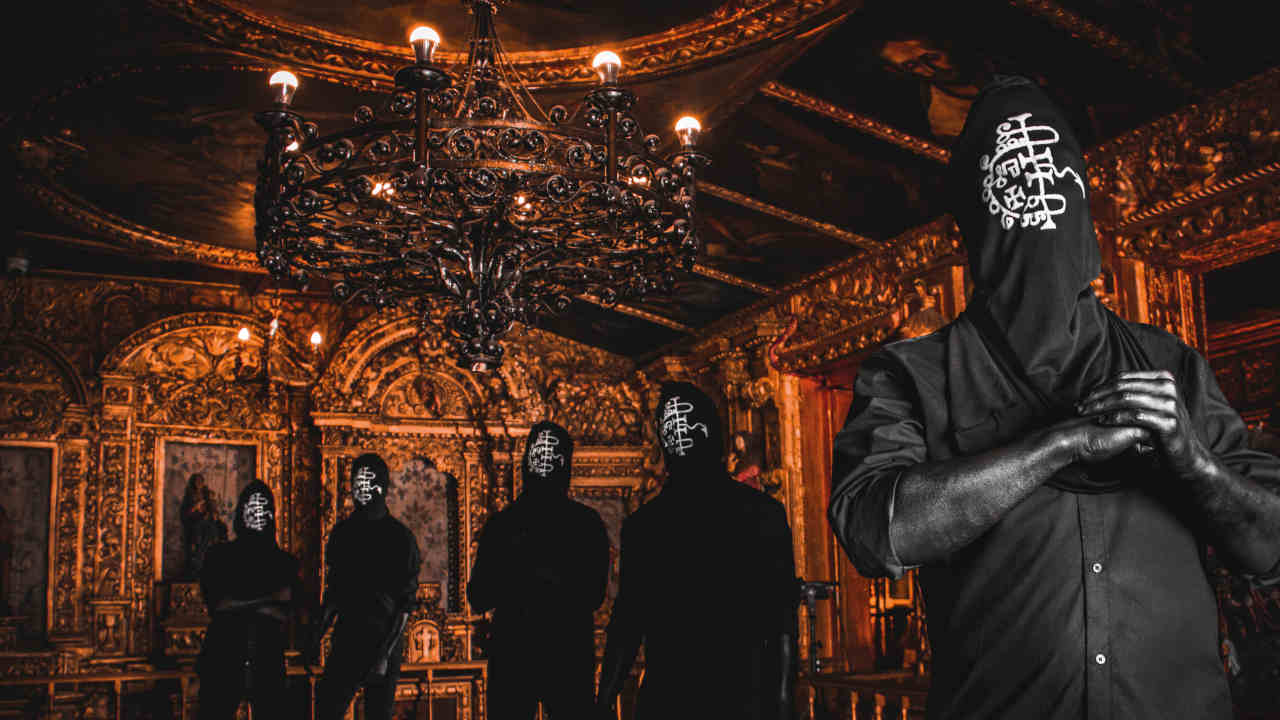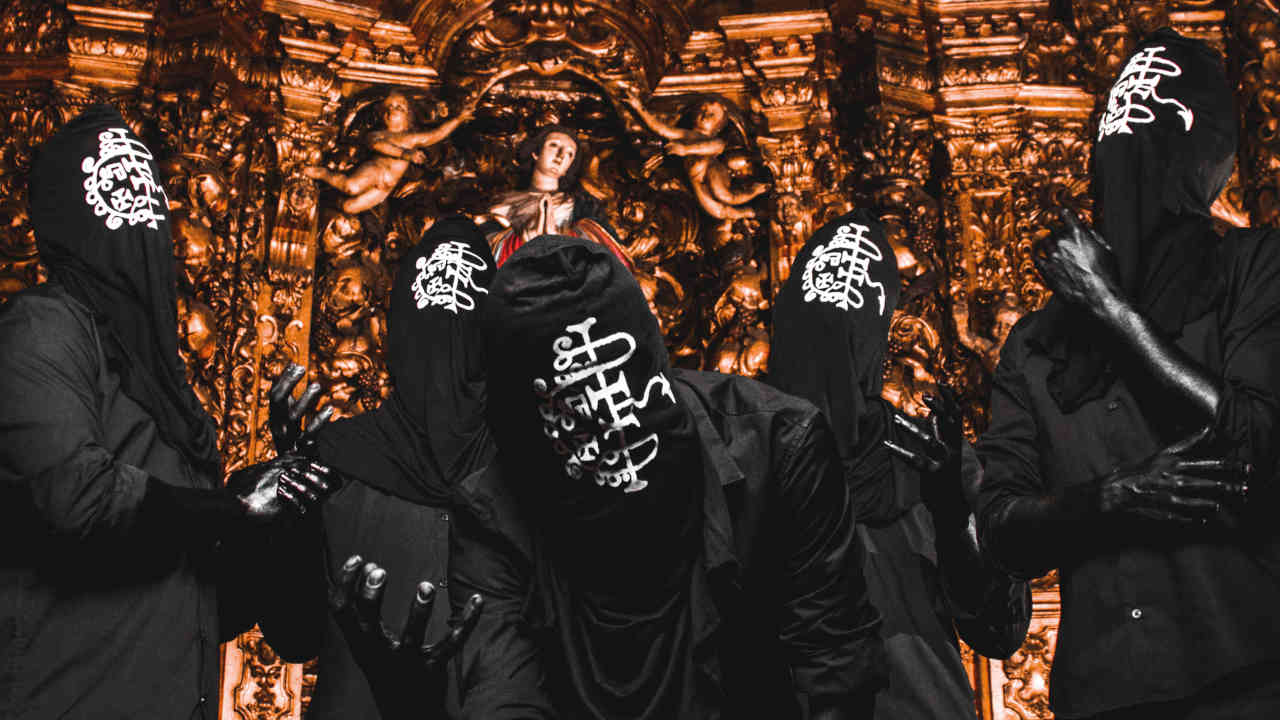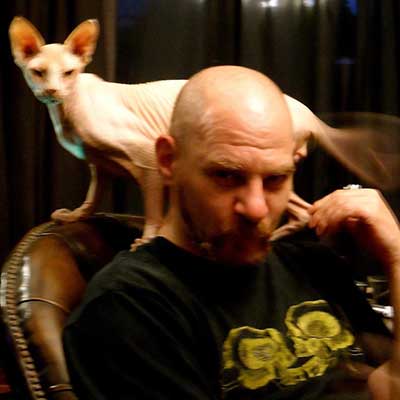The Mosteiro de São Bento da Vitória overlooks Porto’s Douro River, the grids of arches set into its outer walls illuminated at night, reminiscent of a necropolis rather than a monastery. For the visitor, Porto feels like a city full of mysteries. The centuries-old buildings towering on the hills, the cobbled side streets and alleys, and the hidden-away, late-night bars are an ongoing dialogue between the old world and a cosmopolitan new. It’s the place that birthed enigmatic black metallers Gaerea.
“We do get a lot of inspiration from the city,” says their unnamed frontman as we chat in a central hotel. “Porto is growing to be a very utopian city, but also one where some streets aren’t ours anymore. Some streets are just for tourists, and it’s really taking a toll on the cultural aspect of the city. It’s not an old city anymore, it’s an old city that paints itself in different colours to please others.”
For Gaerea’s frontman and mastermind – he’s unwilling to publicly reveal his name, although it’s not impossible to sleuth online – these ever-shifting alliances are both a frustration and a muse, the backdrop for a band whose emotionally searing, expansively unorthodox take on black metal is rapidly gaining fans from all corners of the metal scene.
“Our way of being inspired by the city is to go to all the different alleys, all the different old towns, and watch the people living, complaining and experiencing this very old-school life,” he says.
Gaerea aren’t a band that you just listen to – they’re one you inhabit. From their 2018 debut, Unsettling Whispers, through to 2020’s reputation-ratcheting Limbo, to the imminent, senses-shattering Mirage, all of their albums have documented a singular world they’ve created for themselves – a vision of their home city mapped out onto new, metaphysical terrain.
There’s a narrative running throughout, focusing on a society of ‘lost creatures’ who, at the end of Limbo, finally achieve their goal of self-annihilation by walking en masse into the sea. In an act of ontological cruelty, Mirage resurrects them, the protagonists believing they’re alone, seeking salvation once more, but from states of isolation.
Sitting in the reading room of a pueblo-style yet modern hotel, and unobscured by the ornate, sigil-bearing masks that have become his band’s immediately recognisable hallmark, the singer isn’t the kind of artist who has any imperious air about him. You can sense the capacity for goofiness when he’s talking to his bandmates, but there’s an intensity that comes in whenever he’s discussing a band that, for him, has become a life project.
Although wedded to black metal ideals – as the singer says, “Black metal is the only genre where I truly feel that freedom and artistic liberation” – the power of Mirage is that it doesn’t need to be heard as a black metal album. From the heart-heavy intro of the album’s opening track, Memoir, glimmering like a torchlight illuminating ruins, through to the scarred humanity caught up in Salve’s turbulent whorls, and the title track’s glimpses of Isis-esque, post-rock decadence, it’s an album that transcends scene and genre. Having worked as a video director, it’s unsurprising that the frontman has built a sonic universe whose threshold you cross with an indelible, red-pill sense of revelation.
“We write albums as if they were film scripts,” he explains. “It’s the way I imagine all of these worlds. Each of the songs on Mirage is a specific episode in different people’s lives, and I have all the shots as if it was a music video in my head. It’s how I see this band, and it really bleeds through on all our visuals and how we present ourselves. I can see the whole movie in front of my eyes, and it’s what makes it authentic for me. If I can see all the details of these lyrics, then these songs, the art and the scenarios are real.”

If their debut was an overview of their fictional society as a whole, and Limbo was told from the point of view of the characters, Mirage returns to the perspective of the observer. Its individual, solipsistic tales create a tapestry of vast, devastating scope.
“All the characters in this album are based on people that we either saw or got to know on the road,” explains the frontman. “The song Deluge is about a guy we see every two years when we record our albums in this very secluded town in the centre of Portugal. It’s just old people going to the central café, but we see this guy every day, sitting in his car just watching the café.
“For me, all of these stories have different sides. It’s sadness or loneliness, but also curiosity. And so with all these different characters, we ask: how could this person function in the world that we created for this band? It’s so interesting for me to think about, and this album is about our struggles over our perception of this world: how we make sense of it, and how we reveal more of ourselves through our own reflections.”
As visionary as they are, Gaerea never started with a defined mission. Originally a two-piece, but becoming a full band to play festivals, it was a tour of China in 2019 with Japanese BM legends Sigh, and being exposed to a society bound by alien rules, that fully locked in the concept of the band. That Gaerea emerged from a country not exactly rife with renowned black metal bands to become an ever-increasing cause célèbre is down to the frontman himself.
“You have to sacrifice a whole lot to make your dreams happen,” he says. “We are a poor country and the mentality is to work a lot of hours, focus on getting a house, getting married, paying your bills. So it’s hard to focus on art. But for us, it’s a lifestyle. We’ve had to let go of a lot of comforts. We can’t have a lot of things that young people our age already have, because we want to fucking do this.”
Much like bands such as Watain, Neurosis or Amenra have their own hermetic code, where the boundaries between life and art are all but erased, so Gaerea have one of those rare, collective identities that feels like a totality – an aesthetic and an outlook that runs through every strata of the band. They’ve just made a short documentary to commemorate their fifth anniversary hometown show – perhaps arrogant for a band so young, but indicative of the purpose that drives them on. And then, of course, there are the masks themselves, already iconic, steeping the band in an air of mystique, but serving other, more potent purposes too.
“The sigils are the symbol for Asmoday [aka Asmodeus, the Greek/Hebrew ‘prince of demons’ and representation of lust], which relates to the themes on our first EP [2016’s Gaerea]. We grew up to be more urban than a ritualistic band – if we are ritualistic now, it’s only towards ourselves and how we grow, and how we study human beings – but keeping them really stays true to the beginning of the band. It’s something meaningful, something we don’t want to lose sight of, however we evolve. While we’re onstage, we start to sweat, we don’t see shit, so the only thing we’ve got is our emotion. That’s one of the key aspects of why we need these masks; it’s to get fucking uncomfortable, because that’s how you reach those transcendent moments.”
With a cover featuring the mask cast in gold, Mirage is instinctively enticing, but it’s a foil for what lies within. “Across the album, we burn people alive, we torture people, we just see people going beyond crazy. It’s an invitation into something that you think will be a beautiful ride, but is actually a nightmare,” the singer says.
With a devout following already, Mirage looks set to make Gaerea standard-bearers for the underground scene and beyond. But they’re more than a cult band. Harboured within the skin-peeling riffs, erupting like a pyroclastic flow, is a contemporary plight that speaks to us all.
“We might not be direct on what we want to say, because I want people to dive into the albums,” explains the frontman. “But it’s very clear that we’re talking about humans and about society and about urban life, and how lost we are in this overcrowded world where we have everything to not feel alone. All of our albums are about solitude and loneliness in a very strong and extensive way, and people can relate to it because everybody feels alone these days. It’s not taboo anymore. It’s something I think about so much, and try to figure out, ‘How the fuck does this happen?’”
As immersive an experience as it is, Mirage isn’t an act of escapism, it’s an entreaty to open your eyes to the world around you – to get involved. Gaerea’s uncommon level of dedication to their art, the deep sense of identity they’ve so meticulously crafted, is an opportunity to reacquaint yourself with the scenic route, and through that, to feel as though you belong.
“Perhaps the great problem is that everything is so easy,” the singer concludes. “It doesn’t quite meet the challenge of working for it. You can take an Uber for five kilometres or you could just walk. You will see people; you might encounter the love of your life on that walk. Sometimes we just take real moments for granted, or don’t even recognise them. If you just take shortcuts like we do today, how can you say you lived life to the fullest?”
Mirage is out now

